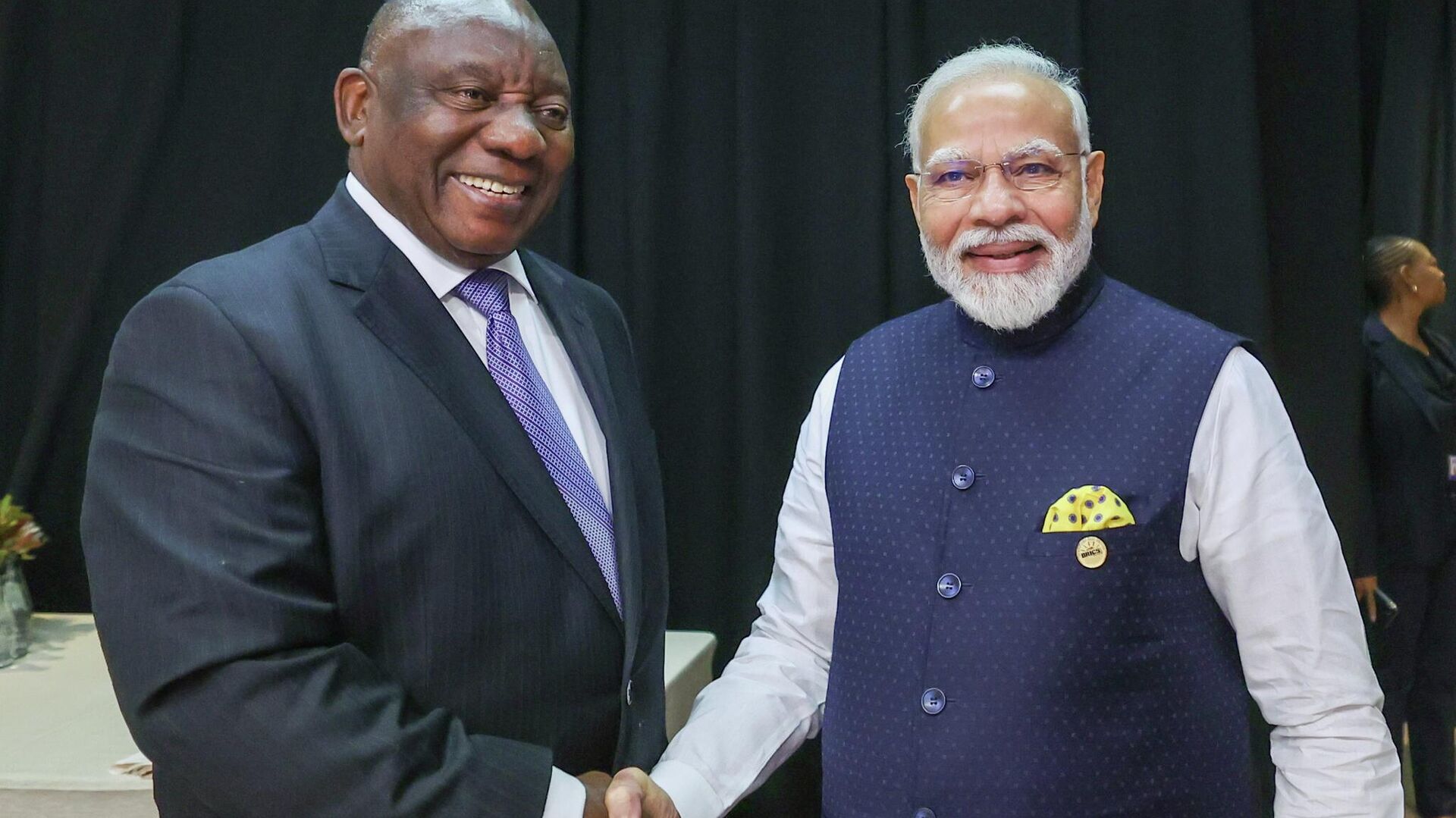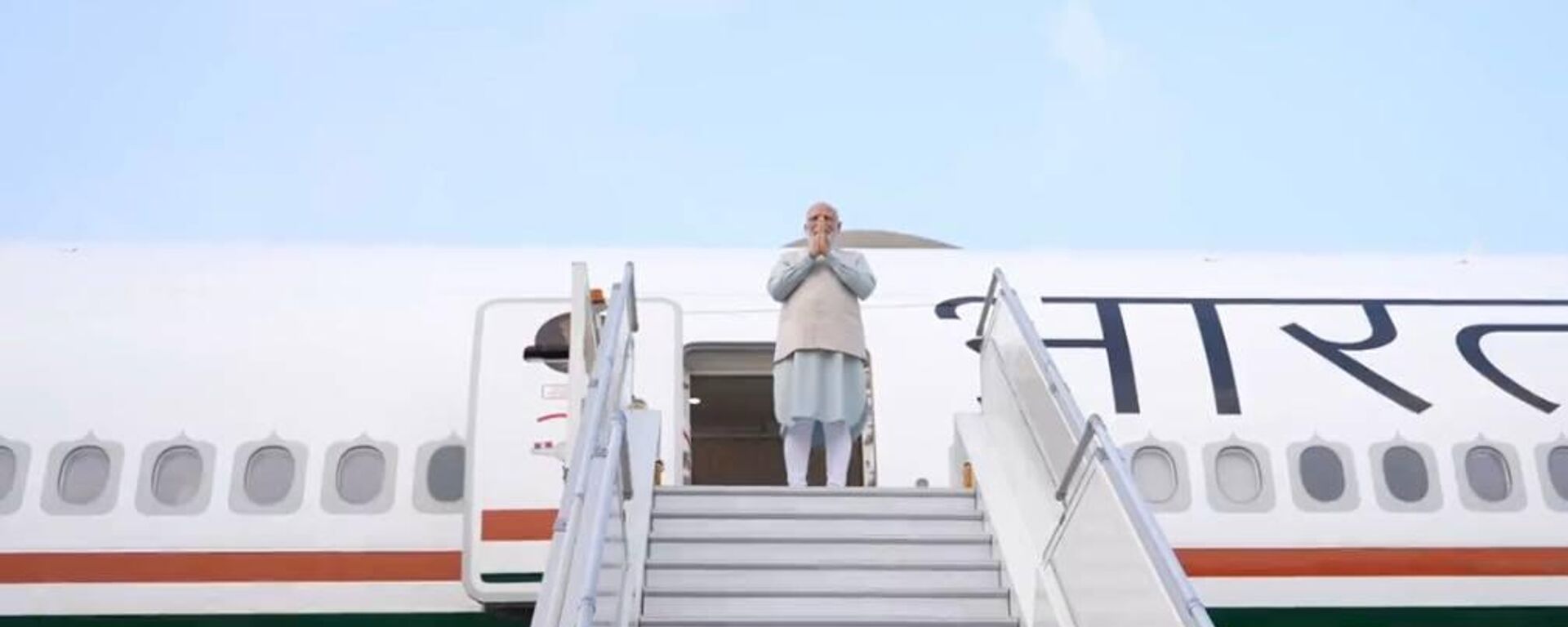https://sputniknews.in/20230828/africas-infrastructure-development-ranks-high-in-indias-priorities-ex-envoy-3880155.html
Africa’s Infrastructure Development Ranks High in India’s Priorities: Ex-Envoy
Africa’s Infrastructure Development Ranks High in India’s Priorities: Ex-Envoy
Sputnik India
Africa’s infrastructural development ranks “very high” on India’s foreign policy priorities, a former Indian envoy to three African countries has told Sputnik.
2023-08-28T16:33+0530
2023-08-28T16:33+0530
2023-08-28T16:33+0530
india g-20 presidency
narendra modi
africa
india
new delhi
african union
g-20
brics
global south
un security council (unsc)
https://cdn1.img.sputniknews.in/img/07e7/08/17/3782633_0:326:2047:1477_1920x0_80_0_0_bf6aa7b58a2370c0a05eba6b23b9fcf6.jpg
Africa’s infrastructural development ranks “very high” on India’s foreign policy priorities, a former Indian envoy to three African countries has told Sputnik India.Bhatia, who has served as New Delhi’s High Commissioner to Kenya, South Africa and Lesotho, emphasized that the Indian policymakers haven’t only been focussed on creating “new mechanism to create more operations between India and Africa under the ACFTA”, but also on the need to improve the continent’s connectivity infrastructure.He expressed confidence that New Delhi would be participating in strengthening Africa’s infrastructure and uplifting the continent’s developmental parameters, in line with the Johannesburg II Declaration released at the conclusion of the BRICS Summit last week.As part of India's ongoing G-20 presidency, New Delhi has also actively advocated for advancing interests of the Global South, with African states being a prominent member of the community.BRICS’ Growing Cooperation With Africa Rests on ‘Three Pillars’The recently concluded BRICS Summit was focussed at increasing BRICS-Africa cooperation as well as intra-BRICS cooperation in the continent, which was evidenced from the theme of the Summit, ‘BRICS and Africa: Partnership for Mutually Accelerated Growth’.The BRICS states have stressed the “importance of strengthening the partnership between BRICS and Africa to unlock mutually beneficial opportunities for increased trade, investment and infrastructure development”, according to the joint statement.Significantly, the five countries also noted in the joint statement that Africa has remained on the “margins of the global trading system” and could substantially gain from increased collaboration on various issues with the BRICS nations.Over 30 African heads of states attended the ‘BRICS Africa Outreach’ and ‘BRICS Plus Dialogue’ on the final day of the BRICS Summit on 24 August, in what was a major outreach towards the continent.According to Bhatia, BRICS’ growing cooperation with Africa rests on “three pillars”:Bhatia reckoned that all the BRICS states have accepted these principles.India Accords High Priority to Ties With Africa: Modi at BRICSAddressing the BRICS Africa Outreach, Indian Prime Minister Narendra Modi stated that New Delhi has a “high priority” to developing ties with Africa.The Indian leader affirmed that New Delhi’s priority in ties with Africa remained on “capacity-building and infrastructure development”.He spelled out that New Delhi has been involved in developing power infrastructure, educational and skill-building institutions as well as other developmental projects in various African nations.Modi also held bilateral meetings with not only South African President Cyril Ramaphosa on the margins of the BRICS Summit, but also with leaders of Ethiopia, Senegal and Mozambique.India-Africa Trade Continuously ExpandingBhatia said that trade cooperation between India and African countries has been continuously “expanding” over the last few years.The ex-diplomat stressed that India’s ties with South African, of the all the African countries, has been “substantial”.He suggested that there was a “great deal of scope for further improvement in intra-BRICS trade”.
https://sputniknews.in/20230823/modi-invited-brics-nations-to-take-advantage-of-indias-rise-ex-envoy-3776583.html
africa
india
new delhi
global south
russia
china
south africa
ethiopia
delhi
Sputnik India
feedback.hindi@sputniknews.com
+74956456601
MIA „Rossiya Segodnya“
2023
Sputnik India
feedback.hindi@sputniknews.com
+74956456601
MIA „Rossiya Segodnya“
News
en_IN
Sputnik India
feedback.hindi@sputniknews.com
+74956456601
MIA „Rossiya Segodnya“
Sputnik India
feedback.hindi@sputniknews.com
+74956456601
MIA „Rossiya Segodnya“
india g20 presidency, brics summit, brics africa outreach, brics summit, africa news, global south, global south summit, indian peacekeepers in africa, un peacekeepers in africa, african union, african union g20, food crisis, food shortages, fertilizer crisis, ukraine russia news, ukraine russia war, russian wheat exports, russian fertilizer exports, un reforms
india g20 presidency, brics summit, brics africa outreach, brics summit, africa news, global south, global south summit, indian peacekeepers in africa, un peacekeepers in africa, african union, african union g20, food crisis, food shortages, fertilizer crisis, ukraine russia news, ukraine russia war, russian wheat exports, russian fertilizer exports, un reforms
Africa’s Infrastructure Development Ranks High in India’s Priorities: Ex-Envoy
India has been pushing for making the African Union (AU) a permanent member of G-20 under its ongoing presidency. New Delhi has also called for a permanent seat for Africa at a reformed UN Security Council.
Africa’s infrastructural development ranks “very high” on India’s foreign policy priorities, a former Indian envoy to three African countries has told Sputnik India.
“I think a number of institutions have been studying the ongoing progress towards the establishment and full operationalization of the African Continental Free Trade Area (AfCFTA), which came into effect in 2021,” stated Ambassador Rajiv Bhatia, a Distinguished Fellow for Foreign Policy Studies at Mumbai-based think tank Gateway House and a member of the Confederation of Indian Industry’s (CII) Africa Committee.
Bhatia, who has served as New Delhi’s High Commissioner to Kenya, South Africa and Lesotho, emphasized that the Indian policymakers haven’t only been focussed on creating “new mechanism to create more operations between India and Africa under the ACFTA”, but also on the need to improve the continent’s connectivity infrastructure.
“Because connectivity is still poor: road transport, railways, fibre and internet connectivity. All that is still not the optimal standard by any stretch. And without the technical connectivity, trade is not possible. So, India is focusing on these two pillars,” Bhatia underlined.
He expressed confidence that New Delhi would be participating in strengthening Africa’s infrastructure and uplifting the continent’s developmental parameters, in line with the
Johannesburg II Declaration released at the conclusion of the
BRICS Summit last week.
As part of India's ongoing G-20 presidency, New Delhi has also actively advocated for advancing interests of the Global South, with African states being a prominent member of the community.
BRICS’ Growing Cooperation With Africa Rests on ‘Three Pillars’
The recently concluded BRICS Summit was focussed at increasing BRICS-Africa cooperation as well as intra-BRICS cooperation in the continent, which was evidenced from the theme of the Summit, ‘BRICS and Africa: Partnership for Mutually Accelerated Growth’.
A major outcome of the BRICS Summit was increasing the membership base to include six new countries — Argentina, Egypt, Ethiopia, Iran, Saudi Arabia and the United Arab Emirates (UAE). Egypt and Ethiopia are members of the African Union.
The BRICS states have stressed the “importance of strengthening the partnership between BRICS and Africa to unlock mutually beneficial opportunities for increased trade, investment and infrastructure development”, according to the joint statement.
Significantly, the five countries also noted in the joint statement that Africa has remained on the “margins of the global trading system” and could substantially gain from increased collaboration on various issues with the BRICS nations.
Over 30 African heads of states attended the ‘BRICS Africa Outreach’ and ‘BRICS Plus Dialogue’ on the final day of the BRICS Summit on 24 August, in what was a major outreach towards the continent.
According to Bhatia, BRICS’ growing cooperation with Africa rests on “three pillars”:
inclusive multilateralism. Bhatia reckoned that all the BRICS states have accepted these principles.
India Accords High Priority to Ties With Africa: Modi at BRICS
Addressing the BRICS Africa Outreach, Indian Prime Minister Narendra Modi stated that New Delhi has a “high priority” to developing ties with Africa.
Modi underscored the fact that New Delhi ranked as Africa’s fourth-largest trading partner and its fifth-largest foreign investor.
The Indian leader affirmed that New Delhi’s priority in ties with Africa remained on
“capacity-building and infrastructure development”.
He spelled out that New Delhi has been involved in developing power infrastructure, educational and skill-building institutions as well as other developmental projects in various African nations.
“Under Agenda 2063, India is a reliable and close partner in Africa's journey to become a global powerhouse of the future,” the Indian leader said.
Modi also held bilateral meetings with not only South African President Cyril Ramaphosa on the margins of the BRICS Summit, but also with leaders of Ethiopia, Senegal and Mozambique.
India-Africa Trade Continuously Expanding
Bhatia said that trade cooperation between India and African countries has been continuously “expanding” over the last few years.
“I think it has touched about $90 billion in the last two or three years, and doing very well,” he noted.
The ex-diplomat stressed that India’s ties with South African, of the all the African countries, has been “substantial”.
“The only African country with which we have any substantive relationship among the African countries, I think South Africa has to be measured. South Africa is very much doing well in terms of trade cooperation with India,” Bhatia remarked.
He suggested that there was a “great deal of scope for further improvement in intra-BRICS trade”.


